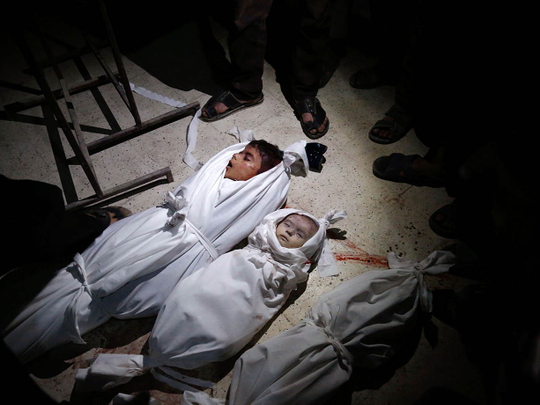
Arbin, Syria: Air strikes have killed at least 11 civilians and wounded dozens over 24 hours in a rebel-held region near the Syrian capital despite a fragile truce, residents and a monitor said.
A strike late Monday killed eight civilians, half of them children, and wounded dozens in the Eastern Ghouta enclave.
The Syrian Observatory for Human Rights reported fresh air raids on the Eastern Ghouta town of Arbin and its outskirts late Tuesday, saying at least three more civilians were killed.
The Britain-based monitor said regime planes carried out the six strikes.
Monday’s strike hit Arbin at around 11.30pm (12.30am Tuesday UAE), residents said.
At least four children and one woman were among the dead, according to medics and the Observatory.
An AFP correspondent who visited the town’s hospital early on Tuesday saw at least five small bodies laid out on the floor, wrapped in white shrouds.
Two of them were toddlers.
Observatory head Rami Abdul Rahman said either government warplanes or those of its Russian ally carried out the bombing, which also wounded at least 30 people.
A Russian military official said there were no air strikes in the Eastern Ghouta region’s ceasefire zone, calling the reports of Monday’s bombing “a complete lie”.
The truce announced for Eastern Ghouta on Saturday was the second thrashed out under an agreement struck by government allies Iran and Russia and rebel backer Turkey in May.
The army said it would observe an indefinite freeze on fighting with rebels in the region.
But the pro-government Al Watan newspaper reported on Monday that the truce excluded areas held by former Al Qaida affiliate Fateh Al Sham Front or its ally Faylaq Al Rahman — which controls Arbin.
A map of Eastern Ghouta shown during a Monday briefing by Russia’s defence ministry appeared to show that the northern half of Arbin was excluded from the zone.
But a Russian military official said Tuesday that reports “about an alleged air strike the evening of July 24 in the Eastern Ghouta de-escalation zone are a complete lie aimed at discrediting the peace process”.
He said contacts with opposition groups in the zone “confirmed that no military hostilities took place in this zone, and there were no air strikes”.
‘Huge explosion’
At the site of Monday’s strike, residents appeared in shock as they cleared rubble from their homes.
“We were sleeping at home when the plane came and fired a rocket,” 13-year-old Mohammad said.
“I was with my mother and sister, we heard a huge explosion so we opened up the bomb shelter and went downstairs,” he said.
Father of four Abu Bashar said the force of the explosion blew out all his doors and windows.
“We couldn’t see anything but dust,” the 30-year-old said.
A pair of exhausted doctors walked through Arbin’s hospital on Tuesday morning after a long night treating patients.
“My sister came to visit me and she and her two children were killed,” a woman cried.
The Observatory said there had been air strikes on Eastern Ghouta on Sunday, at sunset on Monday, and again on Tuesday, but that Monday’s deaths in Arbin were the first civilian deaths there since the truce began.
A similar ceasefire was announced for southern areas of Syria on July 9.
Under the May agreement, “de-escalation zones” are planned for four key battlegrounds between government and rebel forces, but there have been disagreements over their borders and who will police them.
The presence of extremist and allied forces which control large parts of the remaining rebel enclaves has also complicated the ceasefire efforts.
The Syrian government and its Russian and Iranian allies insist the extremists cannot be included in any truce.
Moscow said Monday it had set up two checkpoints and four observation posts in Eastern Ghouta to monitor the ceasefire.
On Tuesday it said it had delivered more than 10,000 tons of humanitarian aid including foodstuffs and medicine to rebel-held parts of Eastern Ghouta.
“The first convoy of humanitarian aid has arrived in Eastern Ghouta,” the defence ministry in Moscow said in a statement.












